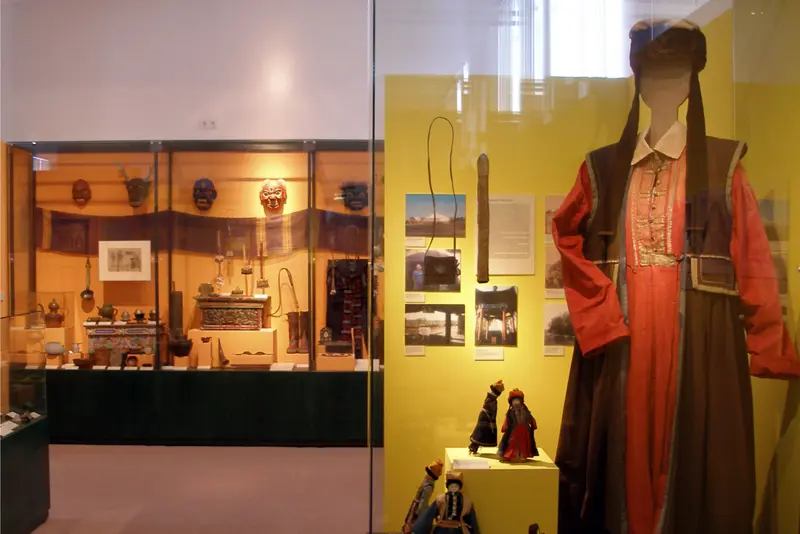Expeditions into the unknown
The missionary activity of the Protestant Moravian Church began in 1732, and evidence shows that the first ethnographical objects were collected by their missionaries in 1740.
In 1732, the missionaries of the Moravian Church in Herrnhut began to bring back objects from their remote journeys, building in this way the founding collection of the Völkerkundemuseum Herrnhut.
On April 29, 2021 the Saxon State Minister for Cultural Affairs and Tourism Barbara Klepsch and the director of GRASSI Museum für Völkerkunde, Léontine Mejier-van Mensch, participated in a round table talk on restitution of Benin objects which had been initiated by Federal Minister of Cultural Affairs Monika Grütters. Political signals a return of the stolen objects have been made. Grütters explained:
We acknowledge the historical and moral responsibility to uncover Germany's colonial past and deal with it properly. […] I am content and grateful to announce that we have been able to set a goal common to all, namely, to further develop and coordinate our position within Germany and to establish reciprocal and respectful communication with Nigeria. Next to utmost transparency we most of all intend substantial returns. In this way we would like to contribute to dialogue and reconciliate with the generations of decendants of those who have been stolen their cultural goods during colonialism. First returns are planned for 2022.“
Both GRASSI Museum für Völkerkunde zu Leipzig and Museum für Völkerkunde Dresden hold objects from former Benin Kingdom. Restituting stolen objects is not only our ethnical and moral duty, it is justn as well the beginning of transnational exchange aiming to understand the consequences of colonialism as our shared history until this day.
In accordance with the Annual Conference of Directors of Ethnographic Museums in the German speaking context 2019 the following official statement was published in Heidelberg on 6 May 2019.
Founded in Vienna in 2010 the Benin Dialogue Group (BDG) brings together state and regional representatives of cultural politics, museum representatives and representatives of the Royal Court of Benin City/Nigeria and European curators for African collections from Vienna, Berlin, Dresden/Leipzig, London, Leiden, Stockholm, Hamburg, Stuttgart, Oxford and Cambridge. Those European collections house important objects and private collections from historic Benin Kingdom in current day Nigeria. Informally speaking, all members of the BDG jointly aim to create a friendly and trustful environment. Some of the objectives proclaimed from the beginning are opening the collections, the digitalisation of collections and academic exchange. A digital inventory of Benin objects being kept in the museums of the world will be put up in order to maintain cooperative projects and exchange, but also to facilitate resititution of objects to Benin City where they will be added to a newly planned museal centre in 2021/22.
press statement
The ethnographic museums in Leipzig, Dresden and Herrnhut, which have been part of the Staatliche Kunstsammlungen Dresden since 2010, have been dealing with their own colonial past. Decolonization is directed against colonial structures of discrimination that are both physically tangible and that influence our ways of thinking. It is an active process open to everyone. The new platform on the website www.skd.museum/dekolonisierung invites dialogue and creates more transparency in ethnological discourse.
The first section, "Current Projects," provides background information on completed and ongoing projects of the three museums with international collaboration partners and groups. In the "Inquiries" section, visitors to the website can find out about the process of restitution and repatriation requests regarding collection holdings and ancestors (ancestral remains), as well as the subsequent research projects. The ‘’FAQ’’ (Frequently Asked Questions) section asks basic questions related to decolonization, restitution, and repatriation, and offers explanations of the specific vocabulary used on the website.
Léontine Meijer-van Mensch: "The ethnological discourse is happening, it is present. It is a process that still requires much in-depth research. We need to think and talk about our own ambivalent past. For example, does a project end when we return the remains of a member of a community, or do we begin a long-term engagement, involving not only the past but also the present and future?"
The Benin Dialogue Group met at the British Museum, London, on 25 October 2021.
The members confirmed as Co-Chairs were Professor Abba Tijani (Director General of the National Commission for Museums and Monuments, Nigeria), His Royal Highness Prince Aghatise Erediauwa (Benin Royal Court), and Dr. Barbara Plankensteiner (Museum am Rothenbaum, Hamburg (MARKK)).
Members included representatives from museums and institutions in Nigeria, the UK, Germany, the Netherlands, Austria, and Sweden. The Group heard presentations from the Director General of the National Commission for Museums and Monuments (Nigeria), from His Excellency Governor Godwin Obaseki of Edo State, from representatives of the Benin Royal Court on behalf of His Royal Majesty Omo N'Oba N'Edo, Uku Akpolokpolo, Ewuare II, Oba of Benin, and from the Executive Director of Legacy Restoration Trust, Phillip Ihenacho, all of whom are actively collaborating to inform the direction and outcomes of current initiatives in Benin City. The members shared information on current activity, including national and institutional developments regarding the return and restitution of Benin works to Nigeria, and discussed future initiatives focused on Benin City.
In addition, the group received an update on the progress of the Digital Benin project that aims to globally unite dispersed objects from the Kingdom of Benin on a single digital platform. All museums represented in the Benin Dialogue Group are participating in this project, thus achieving one of the long-standing goals of the Benin Dialogue Group in providing access to information on collections from the Kingdom of Benin around the world. The group discussed initiatives working towards the development of the museum landscape in Benin City.
The Benin Dialogue Group intends to meet again in late 2022/2023 either in Benin City, Nigeria or Hamburg, Germany.
The missionary activity of the Protestant Moravian Church began in 1732, and evidence shows that the first ethnographical objects were collected by their missionaries in 1740.
